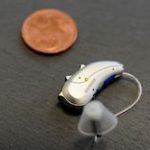
Successes in colorectal cancer screening
Colorectal cancer screening – British researchers develop screening method that “sniffs out” cancer cells in the intestine.
Milton Keynes, UK / Kronberg i.Ts., 10. September 2015 – British scientists, u. a. from the Open University, have developed a new screening method for the early detection of colorectal cancer that significantly improves detection rates and could be an alternative to current screening methods. Thousands of preventive patients could thus be spared an unpleasant and expensive colonoscopy.
Colorectal cancer is the second leading cause of cancer death in men and women according to the German Cancer Research Center (1) and can be treated more successfully if diagnosed at an early stage.
Screening of statutory health insurance
Colonoscopy and hemoccult test (fecal occult blood test, FOBT) are currently used for early detection of colorectal cancer (CRC). People with statutory health insurance are entitled to the FOBT at the age of 50 and from the age of 55 onwards. Age to undergo a screening colonoscopy. However, colonoscopy is not one of the most popular tests among patients. Recent figures on German colonoscopy screening have shown that only about one-fifth of those eligible take advantage of the offer. (2)
.
Advantages and disadvantages of the common blood test
The advantages of hemoccult test screening, such as low invasiveness, low cost, and ease of use, are also offset by disadvantages. Due to its low sensitivity, not all stool samples detect the presence of occult blood, or the test is positive even though other causes are present. If the test is positive, the patient is always asked to undergo an unpleasant and expensive colonoscopy.
New screening method “sniffs out” cancer cells
But a remedy is in sight: British researchers, including renowned scientists from the world’s leading distance-learning university, The Open University, are working to establish a more convenient but nevertheless safer screening method.
The British researchers’ new screening method analyzes stool samples using a sensitive measuring device, a gas chromatograph coupled with a mass spectrometer, which displays the composition of the gases in the sample. The odor pattern of a sample with colorectal carcinoma is markedly different from a sample that was found to have no cancer cells, even if its hemoccult test was positive.
The new method has the potential to improve screening accuracy in a way that could significantly reduce the number of people who would otherwise have to undergo an unnecessary, additional colonoscopy. It could also identify the presence of cancer cells in cases that an FOBT stool test might not detect.
Open University researchers develop “olfactory method” for cancer detection
The procedure has been developed by researchers at the Open University (Dr Claire Turner, Dr Claire Batty, Celia Lourenco), Cranfield University (Dr. Michael Cauchi), and Addenbrooke’s Hospital (Professor John Hunter).
Dr. Claire Turner, lead researcher at the Open University, notes, „This testing method could significantly reduce the number of patients who would need to undergo further investigation after their stool sample is tested, and reduce the anxiety associated with it for patients. The worry of possibly having cancer, even if it is not confirmed, is very stressful.
Unpleasant invasive examination procedures such as colonoscopy should also be avoided whenever possible. Our research shows that
this goal can be achieved with the help of state-of-the-art instruments that sniff out odors from stool“.“
In the next research, this proof-of-concept study will be tested on a larger number of subjects in the hope that this new method will replace current screening tests.
Background on the new screening method in colorectal cancer
About the Open University
The Open University (OU) is the largest academic institution in the UK and a world leader in distance learning. Since its inception in 1969, more than 1.8 million students have been trained. Currently 200 students study here.000 students, of which more than 15.000 from abroad.
The Open University has been consistently ranked in the top ten universities for student satisfaction in the National Student Survey since the survey began in 2005. In 2013/14, the satisfaction rate was 91%. Over 70% of students work full or part time.
80% of the English FTSE-100 companies (comparable to DAX companies) have had their staff continue their studies at OU, including companies from Germany such as Deutsche Telekom, DHL or other internationally active companies such as Pfizer, Ikea, Telefónica O2 or KMPG.
In a recent assessment of university research (UK Research Excellence Framework REF), nearly 72% of research conducted at the Open University received the highest rating of four or three stars, an honor bestowed only on world-leading research. The Open University’s concept of being both accessible to the general public and conducting excellent research makes it unique.





